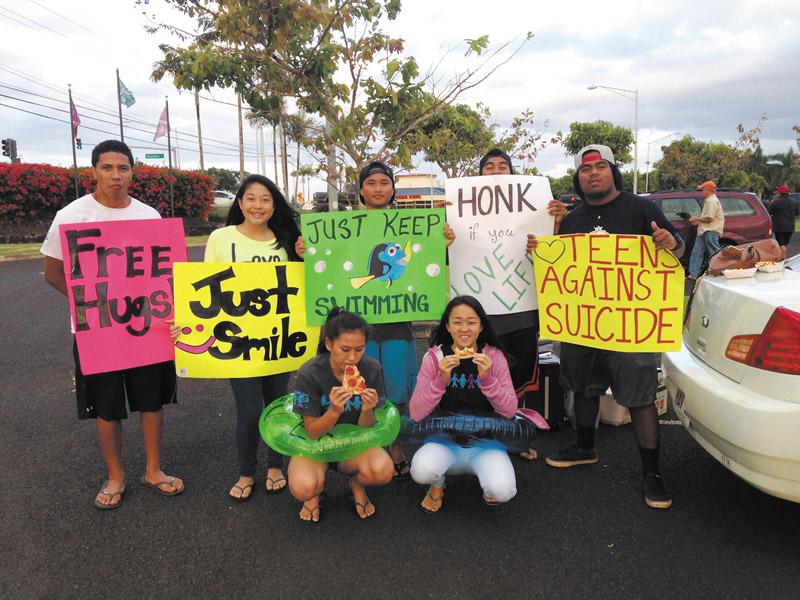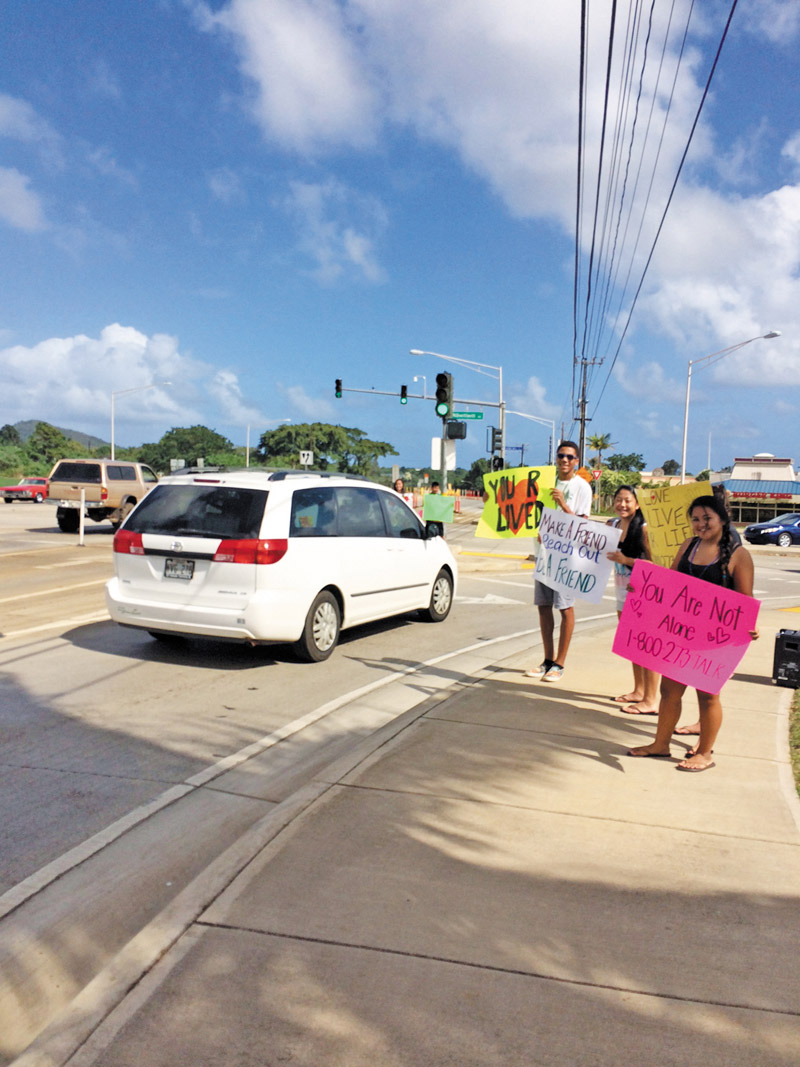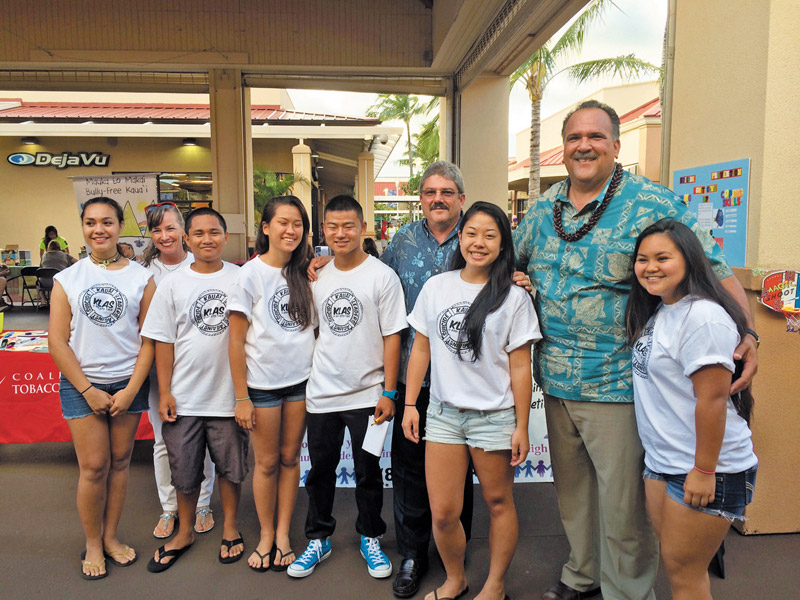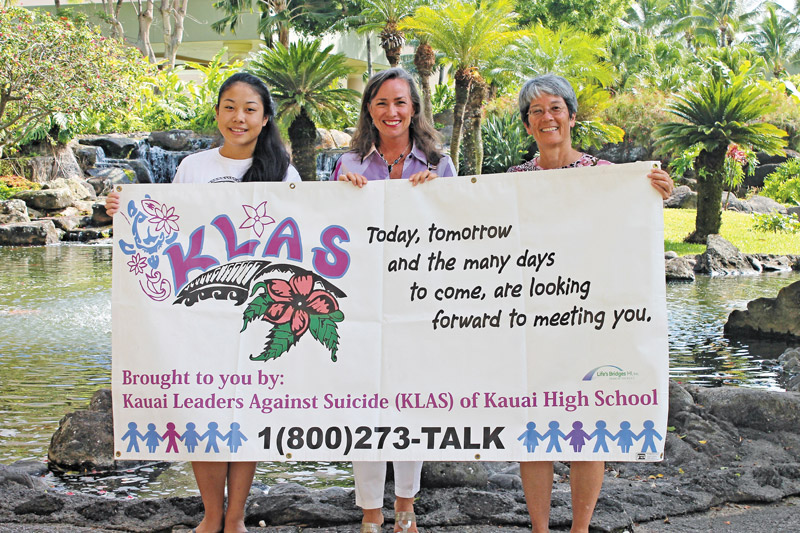Know The Signs
Members of Prevent Suicide Kauai Task Force want you to program this number into your phone right now: 800-273-TALK (8255). Having these vital digits at your fingertips could make a difference between life and death. It’s a crisis hotline for those either contemplating suicide or anyone who knows someone who is.
The 24/7 National Suicide Prevention Lifeline connects callers to someone they can speak with locally who offers professional counseling and provides information about prevention, like where to seek mental health services.
“Being able to pick up the phone and talk to someone is so immediately valuable,” says task force member Bridget Arume.
Sadly, less than 50 percent of those who already have a lethal plan in place reach out for help. People may not understand that it’s nothing to be ashamed of and that every call remains completely confidential. “The information isn’t going to trickle around the community,” says Arume.

Teens sign-waving to help prevent suicide: (back, from left) Isaiah Mawae Kaikua‘ana, Laura Koga, John Lloyd Corbillon, Paulwin Tommy, Brandy Samson, (front) Calcee Nance and Betty Iida. PHOTO COURTESY LAURA KOGA
Besides ensuring everyone has the crisis hotline number, Arume, as well as other community members, including task force chairwoman Madeleine Hiraga-Nuccio, want to help people recognize suicidal behaviors.
One of the first indications is actually talking about it. “People might say something like, ‘I feel so miserable, I just want to die’ or ‘I’m going to just end it all,'” explains Hiraga-Nuccio. “Those kind of statements absolutely should be taken seriously.”
Another serious sign is an abrupt change in someone’s behavior — and it doesn’t have to be in a negative way. “Some people want to be remembered, so they change their behavior in a way to fit how they want to be remembered,” says Arume.
The local suicide prevention group offers several resources to address these behaviors and teaches people how to respond to them, including “SafeTALK” intervention workshops. “Instead, they’re able to reach out to the person and help them get some connections,” says Hiraga-Nuccio.
The reason Laura Koga, who recently graduated from Kauai High School, decided to volunteer for the youth-oriented arm of the task force, Kauai Leaders Against Suicide, was because she wanted to learn how to respond to her peers who were contemplating suicide. “I’ve seen people deal with this enough, and I never knew how to help them; it made me feel helpless,” she says. “High-schoolers need t o know what to look for and how to help others.”

Suicide Prevention volunteers wave hopeful and helpful signs at drivers in Lihue. They plan more sign waving next month. PHOTO COURTESY PREVENT SUICIDE KAUAI TASK FORCE
Though situational things such as the loss of a relationship, job or death of a family member can cause intense grief and thoughts of suicide, the underlying factor almost always is depression; the events will spark the mental illness. Often drugs and alcohol go hand-in-hand with depression, which can cause even more suicidal thoughts.
Arume knows firsthand that those who choose death by suicide don’t have a singular reason for doing so. Her high school boyfriend ended his own life after she moved away to attend college. Even though she felt hopeless, she began to understand that she wasn’t to blame — and neither is anyone else left behind. “It’s not that specific; it’s not that narrow,” she says. “It never is.”
That’s what put her on the current path of helping others who are afflicted with thoughts of suicide, and also assisting their friends and family members to spot the signs before any lethal action occurs. “I want to make sure people realize they have hope and options,” she says. “It can own you or you can own it.”

High school students Kiana Huffman, John Corbillon, Calcee Nance, Donovan Miyasato, Laura Koga and Brittnee Pablo, along with Bridget Arume, who volunteer their time to help inform others about suicide prevention, pose for a photo with Mayor Bernard Carvalho Jr. and Kauai County Council Chairman Mel Rapozo PHOTO COURTESY PREVENT SUICIDE KAUAI TASK FORCE
Teaching tactics like these and using positive reinforcement is what the suicide prevention group uses to help diminish the ongoing epidemic — Suicide Awareness Voices of Education reports more than 42,000 deaths by suicide in the U.S. in 2014 — a number that’s always significantly higher than homicides.
September is Suicide Prevention Awareness Month and the local task force adult and youth divisions will amp up their educational efforts, including sign waving at several locations around the island.
The number to call is 800-273-TALK. Visit health.hawaii.gov/injuryprevention/home/suicide-prevention for more information.
cocomidweek@gmail.com





